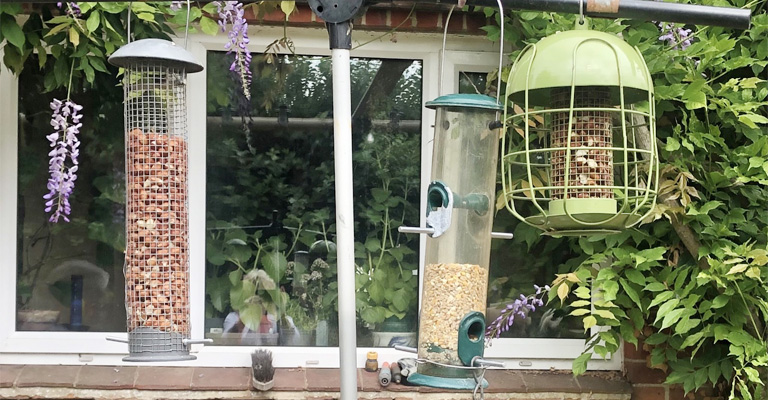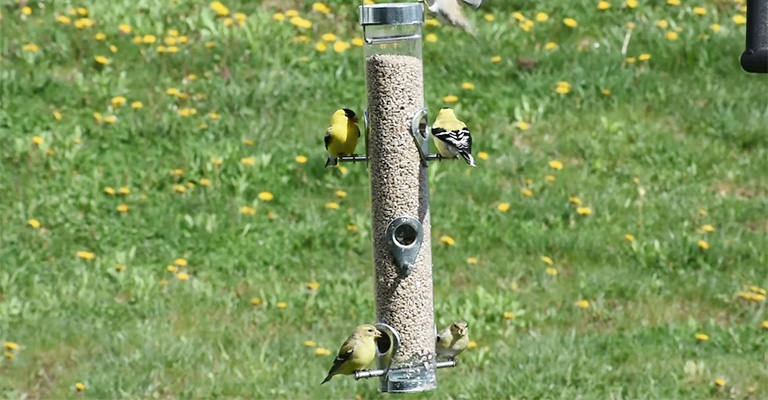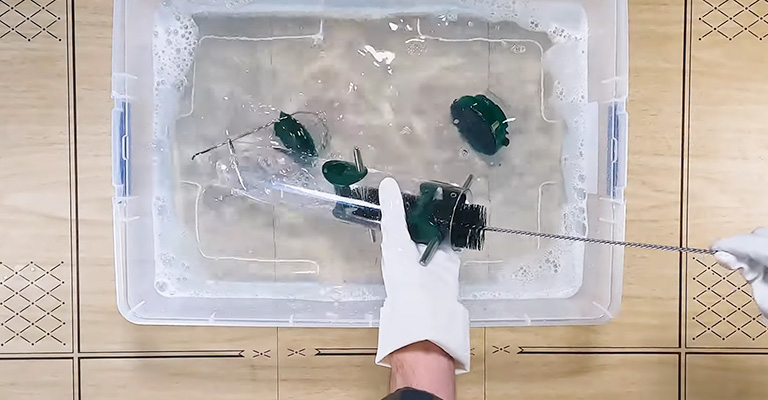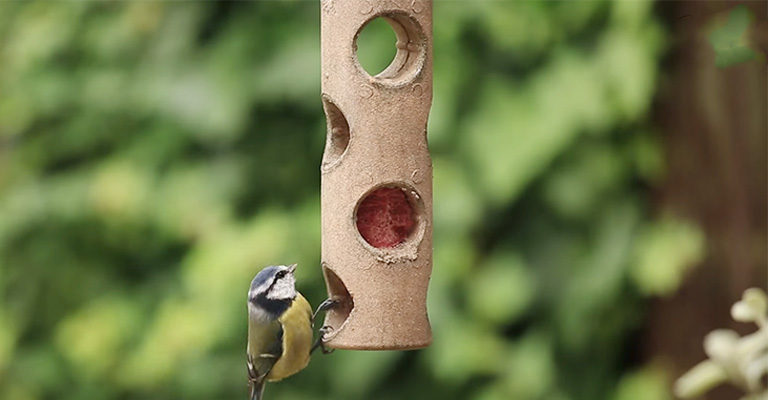Bird watching is a beloved hobby for many, providing a connection to nature and a glimpse into the world of these captivating creatures.
While providing food to our feathered friends through bird feeders is a common practice, it’s essential to recognize that the cleanliness of these feeders plays a pivotal role in the well-being of the avian visitors.
In this blog post, we delve into the often-overlooked question: Can dirty bird feeders make birds sick? Bird feeders, when neglected, can become hotspots for disease transmission, mold growth, and contamination. From Salmonella outbreaks to avian pox, the risks associated with unsanitary feeders are real.
These risks and adopting proper cleaning practices are not only crucial for the health of the birds but also for the enjoyment of this cherished pastime. So, stay focused.

Can Dirty Bird Feeders Make Birds Sick?
Dirty bird feeders can indeed make birds sick. When bird feeders become contaminated with mold, bacteria, or feces, they pose several health risks to our feathered friends. Moldy seeds can produce mycotoxins that harm birds, while damp conditions promote the growth of harmful bacteria like Salmonella.
Birds can contract diseases like avian pox, conjunctivitis, and respiratory infections from contaminated feeders and perches, leading to reduced health and even mortality. Moreover, droppings and uneaten food under a dirty feeder can attract pests like rodents, further increasing disease transmission risks.
To prevent bird illnesses, it’s crucial to regularly clean and sanitize feeders, replace old or spoiled seeds, and maintain clean, dry feeding areas. Responsible feeder upkeep helps ensure the well-being of our avian friends and allows us to enjoy their presence without endangering their health.
How Dirty Bird Feeders Can Make Birds Sick
Dirty bird feeders can pose significant health risks to birds in several ways:
Moldy Seeds
Leftover seeds in a dirty feeder can become damp and develop mold. Birds consuming moldy seeds may ingest mycotoxins, which can harm their health. These toxins can cause various health issues, including digestive problems and weakened immune systems.
Bacterial Growth
Moist conditions in a dirty feeder provide an ideal environment for the growth of harmful bacteria like Salmonella. Birds can contract these bacteria when they come into contact with contaminated seeds or surfaces. Salmonella can lead to severe gastrointestinal infections in birds.
Disease Transmission
Birds can transmit diseases to each other when they gather at feeders. If one bird is infected with a contagious disease, such as avian pox or conjunctivitis, using a dirty feeder increases the risk of spreading the disease to healthy birds that come into contact with contaminated surfaces or feed.
Attracting Pests
Accumulated bird droppings and spilled, uneaten food under a dirty feeder can attract pests like rodents. These pests can carry diseases and introduce them to the bird population, creating additional health risks.
To prevent these problems, it’s crucial to maintain clean and dry bird feeders, regularly clean and disinfect them, and provide fresh, uncontaminated food. Proper feeder hygiene is essential to safeguard the well-being of the birds that rely on your feeders.
The Potential Dangers of Dirty Bird Feeders

Dirty bird feeders can pose various potential dangers to both the birds they attract and the environment. Here are some of the key risks associated with neglected or unclean bird feeders:
Disease Transmission
Dirty feeders can become breeding grounds for harmful bacteria and fungi. Birds that visit contaminated feeders may contract diseases like Salmonella, avian pox, conjunctivitis, and respiratory infections. These diseases can lead to illness, reduced lifespan, or death in the bird population.
Moldy and Spoiled Food
Leftover, damp seeds in dirty feeders can develop mold and become spoiled. Birds consuming such food may suffer from digestive issues, and malnutrition, or even die from mycotoxin poisoning.
Attracting Pests
Accumulated seeds and bird droppings under dirty feeders can attract pests like rodents and insects. These pests can carry diseases and disrupt the ecosystem, potentially leading to further harm to bird populations and local wildlife.
Decreased Attractiveness
Dirty feeders may deter birds from visiting your yard altogether. Birds may avoid feeders with moldy or spoiled food, and this can impact your ability to observe and enjoy these creatures.
Environmental Impact
Discarded or uneaten food from dirty feeders can also have ecological consequences. It can attract non-native or invasive species, disrupt local ecosystems, and promote the growth of unwanted plants.
To mitigate these dangers, it’s essential to regularly clean and maintain bird feeders. Cleaning should include removing old seeds, scrubbing feeders with a mild bleach solution, and allowing them to dry thoroughly before refilling.
How to Clean Bird Feeders?

Cleaning bird feeders is essential to maintain a healthy feeding environment for birds and prevent the spread of diseases. Here’s a step-by-step guide on how to clean bird feeders:
Materials You’ll Need
- Rubber gloves
- A large basin or bucket
- Dishwashing soap
- A scrub brush or old toothbrush
- Vinegar or a mild bleach solution (1 part bleach to 9 parts water)
- Bird feeder brush or pipe cleaners (for hard-to-reach spots)
- Towels or paper towels
- Fresh birdseed
Steps
Gather Supplies
Put on rubber gloves to protect your hands, and gather all the necessary cleaning materials.
Empty the Feeder
Remove all remaining seeds and debris from the bird feeder. Dispose of any moldy or spoiled seeds in the trash, not in your compost pile.
Disassemble If Possible
If your feeder can be taken apart, do so to clean all parts thoroughly. Check for any hidden spots where mold or dirt might be hiding.
Soak in Soapy Water
Fill a large basin or bucket with warm, soapy water (use mild dishwashing soap). Submerge all parts of the feeder in the soapy water and let them soak for 10-15 minutes. This will help soften any stubborn grime.
Scrub and Rinse
Use a scrub brush or an old toothbrush to scrub away dirt, mold, and residue from all parts of the feeder. Pay close attention to crevices and corners. Rinse each part thoroughly with clean water.
Disinfect
To ensure the feeder is free from harmful bacteria, you can disinfect it by either soaking it in a solution of one part bleach to nine parts water for a few minutes or using a vinegar solution (equal parts water and vinegar). Rinse thoroughly with clean water afterward.
Dry Thoroughly
Allow all parts of the feeder to air dry completely. This step is crucial to prevent mold and bacteria from returning.
Reassemble
Put the feeder back together, making sure all parts fit securely.
Refill with Fresh Seed
Once the feeder is completely dry, fill it with fresh, high-quality birdseed. Be sure to store your bird seed in a cool, dry place to prevent it from becoming damp or moldy.
Regular Maintenance
Make cleaning bird feeders a regular part of your bird-feeding routine. Ideally, clean the feeder every 1-2 weeks, or more frequently if you notice it becoming dirty.
Regular cleaning of your bird feeders helps keep the feeding area safe for birds and ensures that you can continue to enjoy the company of these feathered visitors.
Tips to Keep Bird Feeders Clean

Maintaining clean bird feeders is essential for the health of the birds and the enjoyment of your bird-watching experience. Here are some tips to help you keep your bird feeders clean:
Choose Easy-to-Clean Feeders
When purchasing bird feeders, opt for designs that are easy to disassemble and clean. Feeders with removable parts make the cleaning process more straightforward.
Regular Cleaning Schedule
Establish a regular cleaning schedule for your bird feeders. Depending on the weather and the level of bird activity, aim to clean them every 1-2 weeks or more frequently if needed.
Rotate Feeders
If you have multiple feeders, periodically rotate them. This allows you to clean and disinfect one while the birds continue to feed from the other.
Use a Feeder Brush
Invest in a specialized bird feeder brush or long pipe cleaners to reach into crevices and small openings where dirt and mold may accumulate.
Empty and Refill
Avoid topping off partially filled feeders. Instead, empty the feeder completely before refilling it with fresh seed. This prevents the buildup of old, potentially contaminated seeds.
Provide the Right Amount of Food
Offer only as much birdseed as the birds can consume in a few days. This reduces the likelihood of spoilage and waste.
Clean the Area
Regularly clean the area under your bird feeders to remove spilled seeds, bird droppings, and other debris. This helps prevent the attraction of pests and the growth of unwanted plants.
Position Feeders Wisely
Place feeders in locations that receive good airflow and sunlight. These conditions can help prevent the buildup of moisture, which can lead to mold growth.
Use Fresh Seed
Purchase high-quality, fresh birdseed from reputable sources. Stale or moldy seeds can lead to health issues in birds.
Monitor Bird Activity
Keep an eye on the birds that visit your feeders. If you notice signs of illness, such as lethargy or disheveled feathers, temporarily remove the feeders, clean them thoroughly, and allow the area to rest to prevent disease transmission.
Practice Safe Disposal
Dispose of spoiled seeds and cleaning materials properly. Do not compost spoiled seed or throw it in your garden, as it can introduce mold and disease.
Keep Squirrels and Rodents Away
Use squirrel-proof feeders or baffles to deter squirrels and other pests from accessing the bird seed. Pests can introduce contamination and create a mess.
Educate Others
If you have neighbors or friends who also feed birds, share the importance of regular cleaning and bird feeder hygiene to help maintain a healthy bird population.
By following these tips and maintaining a clean feeding environment, you can enjoy the presence of birds in your yard while ensuring their well-being and health.
Benefits of Clean Bird Feeders
Maintaining clean bird feeders offers several benefits, both for the birds and for your overall bird-watching experience:
Healthier Birds
Clean feeders help prevent the spread of diseases among the bird population. Birds that feed from clean, uncontaminated feeders are less likely to contract illnesses, ensuring their long-term health and well-being.
Increased Bird Attraction
Birds are more likely to visit and feed at clean feeders. They can detect spoiled or moldy seeds, and when presented with fresh, high-quality seeds, they are more likely to return to your yard regularly.
Better Bird Watching
Clean feeders provide a clear and unobstructed view of the birds that visit. You’ll have a better opportunity to observe their behavior, interactions, and unique characteristics.
Reduced Pest Attraction
Cleaning up spilled seed and debris around feeders reduces the attraction of pests like rodents and insects. This, in turn, helps maintain a cleaner and more inviting feeding area.
Longer Feeder Lifespan
Regular cleaning and maintenance can extend the lifespan of your bird feeders. Clean feeders are less likely to deteriorate due to mold, rot, or corrosion, ensuring you get more value from your investments.
Environmental Benefits
Proper bird feeder hygiene minimizes the risk of introducing non-native plant species and pathogens to the environment. It also helps maintain a balanced local ecosystem.
Educational Value
Clean feeders provide an opportunity for educational activities, such as identifying bird species, teaching kids about nature, and conducting birdwatching studies.
Peace of Mind
By ensuring that your bird feeders are clean and safe, you can have peace of mind knowing you’re contributing to the overall health and conservation of local bird populations.
Enjoyment for All Ages
Birdwatching is a hobby that can be enjoyed by people of all ages. Clean feeders make it more accessible and enjoyable for everyone, from children to seniors.
Contributing to Research
If you participate in citizen science projects or bird counts, maintaining clean feeders can provide more accurate data on bird populations and behavior.
Clean bird feeders create a healthier and more inviting environment for birds, promote responsible bird feeding, and enhance the birdwatching experience for enthusiasts.
FAQs
Yes, dirty bird feeders can make birds sick. Moldy seeds, bacterial growth, and contaminated surfaces can transmit diseases and toxins to birds. Regular cleaning and maintenance are essential to prevent health risks to the avian visitors.
Birds can contract diseases like Salmonella, avian pox, conjunctivitis, and respiratory infections from dirty feeders. These diseases can lead to illness, reduced lifespan, or even death in bird populations.
It’s recommended to clean your bird feeders every 1-2 weeks, or more frequently if needed. Regular cleaning prevents the buildup of mold, bacteria, and spoiled food that can harm birds.
Yes, moldy or spoiled seeds can harm birds. They may contain mycotoxins that can lead to digestive problems, malnutrition, and other health issues. It’s crucial to provide fresh, uncontaminated seed to ensure bird health.
To prevent bird diseases, maintain clean feeders, use fresh seed, and keep the feeding area dry. Also, consider providing multiple feeding stations to reduce crowding, as this can help limit disease transmission among birds.
Wrapping Up
The answer to whether dirty bird feeders can make birds sick is a resounding yes. The health and safety of the birds that grace our yards depend on our diligence in maintaining clean and hygienic feeding stations.
Regular cleaning, providing fresh seeds, and monitoring bird activity are key steps in safeguarding the well-being of our feathered visitors. By taking these precautions, we can continue to enjoy the beauty and wonder of birds while contributing to their overall health and conservation.
Remember, responsible bird feeding goes hand in hand with responsible bird watching. Thank you for your support.